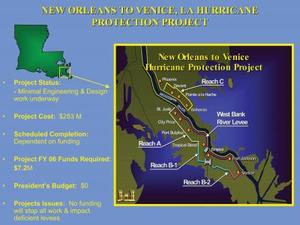InfrastructureSenate passes water resources bill, funding flood control projects
Several projects for the Army Corps of Engineers will now be expedited under a bi-partisan Senate legislation passed last Wednesday. The authors of the bill hope the legislation will move the Morganza-to-the-Gulf hurricane protection project forward. The project goal is to install a series of levees, locks, and other systems through the Terrebonne and Lafourche parishes, which will protect about 200,000 people from storm surges like the ones Hurricane Katrina caused.

Bi-partisan funding bill will allo projects like this to go forward // Source: utexas.edu
Several projects for the Army Corps of Engineers will now be expedited under a bi-partisan Senate legislation passed last Wednesday.
The New Orleans Times-Picayune reports that key provisions of the bill will:
- Give the corps authority to perform future levee lifts on the New Orleans area hurricane protection system
- Authorize more money from the Harbor Maintenance Trust Fund, financed by shipping companies, to dredge waterways, including the Mississippi River and Calcasieu River ports
- Allow states to borrow from the federal government to cover required matching local costs for corps projects. Vitter said this should insure that projects ready to move forward are not delayed when local governments cannot come up with the required matching share, which is often 35 percent.
Senator David Vitter (R-Louisiana) hopes the legislation will move the Morganza-to-the-Gulf hurricane protection project forward. The project has costs more than $10 billion according to the latest report by the Corps of Engineers.
The project goal is to install a series of levees, locks, and other systems through the Terrebonne and Lafourche parishes, which will protect about 200,000 people from storm surges like the ones Hurricane Katrina caused.
“While this bill makes important, commonsense reforms that will help keep our rivers dredged, ports maintained and build the critical flood control infrastructure we need to stay safe during storms, it will take serious funding to make these projects in Southeast Louisiana a reality,” Senator Mary Landrieu (D-Louisiana) told the Times-Picayune.
Some changes were made to the bill to address the concerns of environmental groups. These groups pointed to the Mississippi River-Gulf Outlet, which contributed substantially to flooding after Hurricane Katrina, as an example of projects that need to be avoided in the future.
Frances Beinecke, president of the Natural Resources DefenseCouncil told the Times-Picayune That “The original version of this bill significantly undermined the ability to conduct those reviews. Thanks to efforts by key senators, the final bill restored some protections, but this bill still needlessly limits public review in ways that will harm the environment, and it should not become law in its current form.”
Senator Barbara Boxer (D-California), chair of the Senate Environment and Public Works committee, said the bill is up to code with current environmental regulations required by federal law, but provisions have been added to prevent unnecessary delays.
